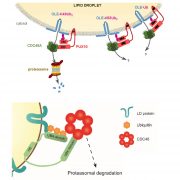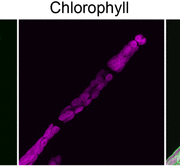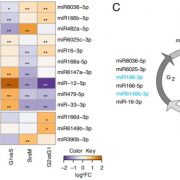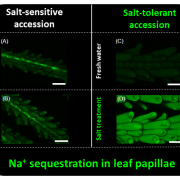S-Sulfhydration Disrupts Actin Polymerization
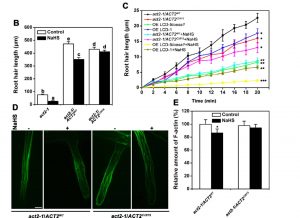 Recent evidence indicates that H2S acts as an important messenger that affects plant responses to abiotic stresses, including high salinity, drought, heat shock, heavy metals, and oxidative stress. H2S signaling has also been shown to modulate important physiological processes, such as photosynthesis, immunity, cell senescence, root growth, and stomatal closure. Although many studies have described the physiological effects of H2S in plants, its underlying mechanisms are poorly understood. It is known, however, that H2S directly regulates the S-sulfhydration status and the functions of specific proteins by converting the thiol groups of cysteine residues to persulfides. In plants, cysteine (Cys) desulfhydrases (CDEs) contribute to H2S generation. Two enzymes, L-CYSTEINE DESULFHYDRASE (LCD) and D-CYSTEINE DESULFHYDRASE (D-CDES), degrade Cys to H2S and are responsible for the release of H2S into the cell. Both Arabidopsis LCD and D-CDES-deficient mutants (lcd and dcdes, respectively) reduce the concentration of endogenous H2S. O-ACETYLSERINE (THIOL) LYASE (OAS-TL), on the other hand, catalyzes the formation of Cys by incorporating the sulfide into O-acetylserine (OAS). oastlA and oastlC mutants are compromised in their ability to detoxify H2S and, as a result, sulfide concentrations become elevated. By studying these mutants, Li et al. (10.1104/pp.18.00838) have uncovered evidence that H2S regulates actin dynamics and affects root hair growth in Arabidopsis. In the OE LCD/oasa1 plants that have elevated levels of H2S, S-sulfhydration was enhanced and the density of filamentous actin (F-actin) bundles and the F-actin/G-actin ratio decreased. An analysis of actin dynamics suggested that S-sulfhydration inhibited actin polymerization. The overaccumulation of H2S also inhibited root hair growth.
Recent evidence indicates that H2S acts as an important messenger that affects plant responses to abiotic stresses, including high salinity, drought, heat shock, heavy metals, and oxidative stress. H2S signaling has also been shown to modulate important physiological processes, such as photosynthesis, immunity, cell senescence, root growth, and stomatal closure. Although many studies have described the physiological effects of H2S in plants, its underlying mechanisms are poorly understood. It is known, however, that H2S directly regulates the S-sulfhydration status and the functions of specific proteins by converting the thiol groups of cysteine residues to persulfides. In plants, cysteine (Cys) desulfhydrases (CDEs) contribute to H2S generation. Two enzymes, L-CYSTEINE DESULFHYDRASE (LCD) and D-CYSTEINE DESULFHYDRASE (D-CDES), degrade Cys to H2S and are responsible for the release of H2S into the cell. Both Arabidopsis LCD and D-CDES-deficient mutants (lcd and dcdes, respectively) reduce the concentration of endogenous H2S. O-ACETYLSERINE (THIOL) LYASE (OAS-TL), on the other hand, catalyzes the formation of Cys by incorporating the sulfide into O-acetylserine (OAS). oastlA and oastlC mutants are compromised in their ability to detoxify H2S and, as a result, sulfide concentrations become elevated. By studying these mutants, Li et al. (10.1104/pp.18.00838) have uncovered evidence that H2S regulates actin dynamics and affects root hair growth in Arabidopsis. In the OE LCD/oasa1 plants that have elevated levels of H2S, S-sulfhydration was enhanced and the density of filamentous actin (F-actin) bundles and the F-actin/G-actin ratio decreased. An analysis of actin dynamics suggested that S-sulfhydration inhibited actin polymerization. The overaccumulation of H2S also inhibited root hair growth.


